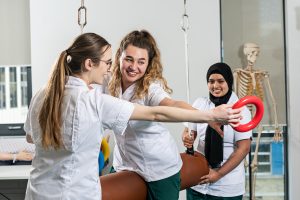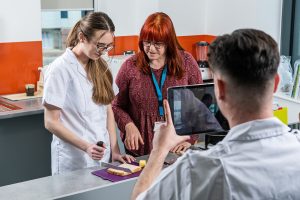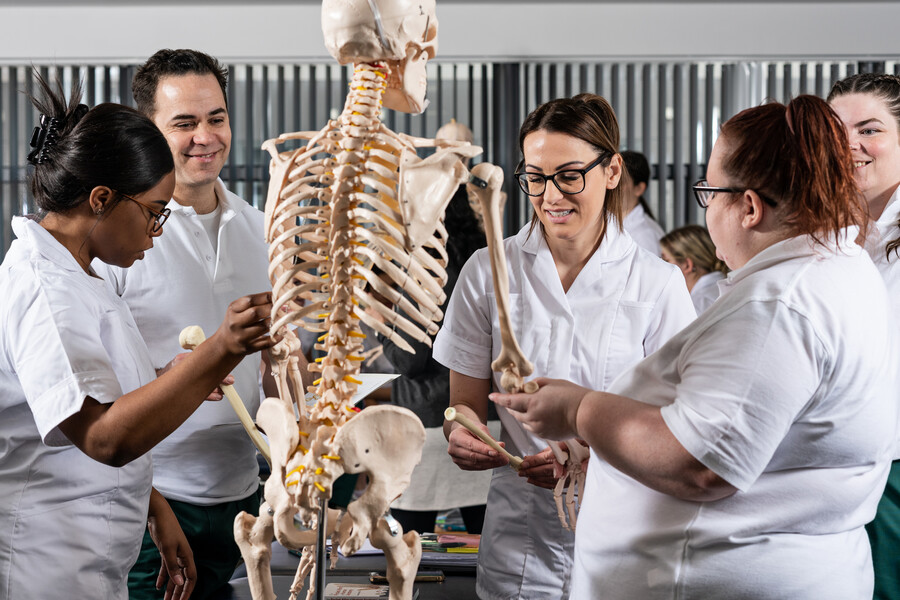 Produced by Guest blogger
Produced by Guest blogger
This is a guest blog by Gabriella Maraschin, BSc (Hons) Occupational Therapy student at Bournemouth University.
During the course, I really enjoyed having external Occupational Therapists (OTs) come in and talk about their specific topic or specialty. Another highlight was external workshops which involved organisations coming in every so often to give practical skills sessions e.g. during the week we were learning about hand function and OTs from the hand therapy clinic that came in and showed us different assessments they use and then we got to do those assessments on each other. They also simulated what it’s like to have decreased hand mobility and sensation so that we got a glimpse into what it’s like for our service users.
The skills sessions in the simulation room were also really cool and we got the opportunity to put our theory into practice, such as equipment issuing or familiarising ourselves with different assessments and then we would ‘roleplay’ and practice assessments on each other. Growing closer together and stronger as a cohort was another highlight as we’ve all gelled really well and have become a little family. We make little study groups throughout the semester before we start assignments, where we can listen to everyone’s perspectives and their interpretation of the question and help each other.
For my placement, I was placed in the older persons team at a local acute general hospital. I had never worked in a healthcare setting before, so I was beyond excited to start a new adventure and I could not have asked for a better placement experience, all the members of the team were all so welcoming and helpful.
My practice educator was very supportive and always pushed me outside my comfort zone which helped me to grow. My placement helped me to put all the theories and skills I’ve learned in lectures and seminars into practice. I think it’s great to have that experience early on in your studies as it gives you a real-life glimpse into what you could go into once you graduate.
Every day I came home with a feeling of fulfilment that I had made a positive difference in somebody’s life that day and my mentor was really great in providing me with opportunities to shadow other therapists in different teams. This helped me to gain a broader perspective on what other paths OTs can take and how the different teams work and interact with patients. A few of my classmates were also placed in the same team or hospital as me, and so we became each other’s support systems throughout the days on placement and it was really comforting to see a familiar face in the hospital on good days and bad days.
Whilst I thoroughly enjoyed my placement, it didn’t come without its challenges. Having never worked in health care before, I was extremely nervous about interacting with patients. I was very shy the first few days, but I soon became more confident and began trusting in myself and my knowledge more. One aspect that really helped me to become more confident was working with an amazing therapy assistant where I shadowed her for a few hours and then I got the opportunity to just speak to the patients and interact with them.
I also struggled with the volume of reading material, but I soon got used to the readings and became more interested in them which made reading much more manageable. Once I became much more diligent and realised how much the pre/post reading helps in understanding the lecture content, it was easier to read as I understood the benefits. Managing self-study was also a real transition from school, but self-managed learning greatly developed my self-control and perseverance.
After graduating, I am very interested in specialising and completing a master’s in line with pediatrics or neurological conditions and I’m also interested in equine-assisted therapy, which I am currently looking into to gain further experience. I would also like to travel around the world to work with deprived communities in need of OTs.
I would advise those thinking of joining the course to gain experience by job shadowing or researching well into the role of an OT so that you know what to expect. I would also recommend staying on top of your reading and self-study as it really does help in your understanding. I would also say to try to establish a routine and balance regarding socialising and working, as your friends and leisure time will be critical in maintaining your mental health.



 My experience on the Student Leadership Programme
My experience on the Student Leadership Programme What’s Occupational Therapy really like?
What’s Occupational Therapy really like? The Student Midwife the toddler and the night shift
The Student Midwife the toddler and the night shift My social work placement leads to a job offer
My social work placement leads to a job offer









Occupational therapy in patients with what disease?